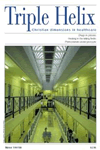Prayer can be bad for your knees.
1,500 year-old skeletons stored beneath the crypt of St Stephen's Monastery in Jerusalem have revealed that almost all the monks had arthritis of the knees. It is concluded they spent much time kneeling in daily worship. Any evidence of this association nowadays? (Source: The Sciences, 1997; 37(4):11)
But faith helps healthy immunity?
Researchers in North Carolina tested a randomly selected group of 1,727 elderly adults for immune system activity. The 60% who went to church at least once a week were healthier on five out of nine tests. Comments the trial leader: 'People who have a strong faith, go to church, and have the support of others involved in the church, are less depressed and less stressed. They are not as anxious as other people . . there may be a lot of benefits to (religion) in terms of mental and physical health.' (Source: The Times, 24 October 1997)
NPs alongside GPs?
In an editorial entitled 'Nurse practitioners in general practice - an inevitable progression?', NPs are reported doing more and more in primary care, and in well-referenced statements are described as 'popular with patients and good at listening, explaining and understanding'. 'They are not however a cheap alternative to doctors' and it doesn't surprise Eutychus that 'the development of the NP role is being hampered by finance'. (Source: British Journal of General Practice, November 1997; p696-697)
Council of Europe bans human cloning.
A protocol banning human cloning has been adopted by the Council of Europe. It would prohibit 'any intervention seeking to create a human being genetically identical to another human being, whether living or dead'. The protocol must now be ratified by all 40 members. (Source: British Medical Journal, 15 November 1997; 315: 1252)
After Dolly, Polly.
Polly is not a parrot but a sheep, born in July 1997, genetically engineered to carry human genes and then cloned. She and her four sisters open up commercial possibilities for producing flocks of identical sheep or other farmyard animals able to produce human proteins in their milk for the treatment of disease. (Source: Nick Nuttall, The Times, 25 July 1997)
Children haunted by violent videos.
A British Psychological Society conference was told in September that graphic scenes of screen violence stick in children's minds and have a far more profound effect on them than nudity, sex scenes or bad language. 1,500 children aged between 10-11 were interviewed in South Australia and asked to describe scenes from commercially available videos. Said researcher Glenn Cupit: 'Children most often report particularly persistent and unwelcome memories about violent scenes like people being cut up with chainsaws, being put through meat mincers and that sort of thing'. (Source: Roger Dobson, The Independent, 15 September 1997)
Divorce damages children long term.
A British longitudinal study carried out for the Joseph Rowntree Foundation followed more than 11,400 children born in 1958 and found that children who grew up with both parents were on average better qualified and obtained better jobs. However, it was financial hardship and factors before the divorce which were thought to explain the poorer outcome. (Source: British Medical Journal, 4 October 1997; 315: 832)
Sterilisation without consent in Sweden and France.
In two separate BMJ articles, up to 60,000 Swedish women were reported to have been forcibly sterilised from the 1930s to the 1970s for 'undesirable' racial characteristics or otherwise 'inferior' qualities such as very poor eyesight, mental retardation or an 'unhealthy sexual appetite'; while in France it was claimed that tubal ligation - which even when voluntary is illegal - has been performed in recent years on about 15,000 mentally handicapped women, sometimes without their permission and even without their knowledge. Is eugenics ever far away? (Sources: British Medical Journal, 6 September 1997; 315: 563 and 20 September 1997; 315: 697)
Scientists with faith.
The percentage of scientists with religious faith has remained almost steady for 80 years. In 1916, 42% of scientists believed in a God who hears and answers prayer, while in 1996 the figure was 39%. (Source: Nature, 3 April 1997 reported in Religion Watch, May 1997, Vol.12 No.7 p4)
Spring Harvest young people and drugs.
In a paper titled 'Knowledge and experience of drug use amongst church affiliated young people', Cook et al describe a self report questionnaire survey among 7,666 young people at Spring Harvest in 1995. The statistics for those offered drugs and those trying drugs were only slightly lower overall than in secular surveys, though those giving more positive responses to questions on Christian commitment were significantly less likely to have been offered the drugs listed or to have used them. Churches take note. (Source: Drug and Alcohol Dependence, 1997; 46: 9-17)
Enabling the disabled.
Healing and Wholeness has a superb two-page spread of cartoons giving brilliant insights into attitudes to disability. The themes behind the cartoons give some hint: 'the compulsive labeller, the fixated stare/horrified flinch, the ignore-it ostrich, the over-willing helper, the intrusive friend, the admiring sanctifier, and the obsessive healer'. (Source: Healing and Wholeness, November/December 1997; p32-33)
Patients have responsibilities too - official.
Health Secretary Frank Dobson announced in October that the British government will replace the patient's charter with a new NHS Charter which will emphasise patients' responsibilities to the health service, for example, in keeping appointments and in treating NHS staff with respect. It will be published in July to coincide with the 50th anniversary of the NHS. Eutychus remembers stern instructions on early NHS medical cards and welcomes any reminder of reciprocal responsibility. (Source: British Medical Journal, 18 October 1997; 315: 971)































